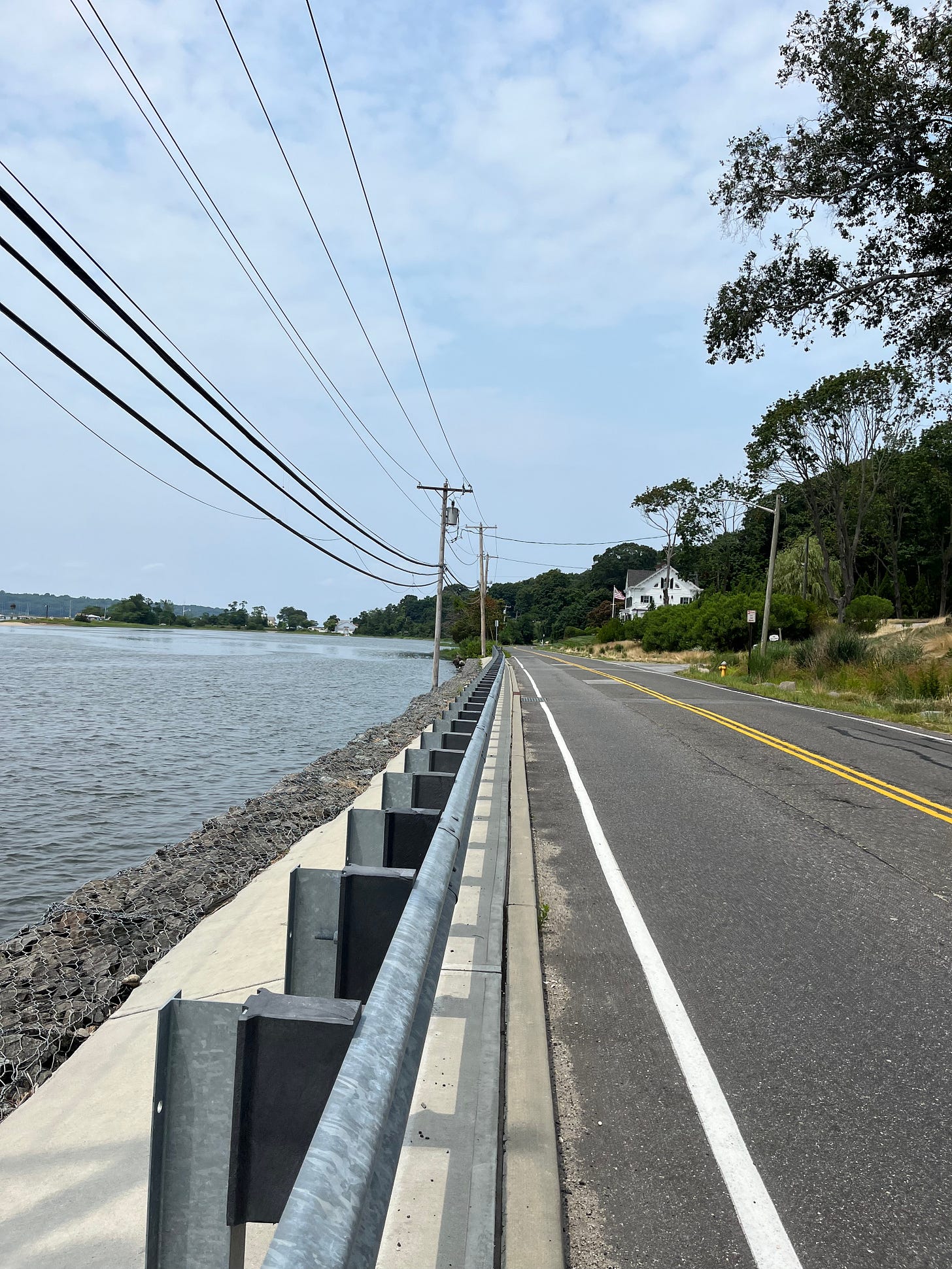Today and yesterday I walked on the side of the road along a harbor. Picture:
Yesterday, after my walk, I couldn’t stop thinking about it or looking at this picture, as if I’d met someone I had a feeling I’d fall in love with. So today I returned and walked further, as far as possible before there was only private property ahead. When experiencing such a beautiful landscape, I never know what to do with myself. Don’t know how to show gratitude for it, don’t know how to soak it in.
I jotted down notes on my phone as I walked today, inspired by the most mundane of things, like a crushed cigarette pack on the ground or a car whirling by me. I realized that all my life I’ve been searching for hiding places. As a kid I would crawl into my closet and transform it into a kind of fort. I would squeeze into a square-shaped gap in the basement that I think was intended for storage, convinced I was about to find Narnia. I long for a secret magic wonderland. And the second part of my realization was that that’s what writing is for me. A place to hide, an endless hallway of doors leading to more exhilarating places just for me.
I listened through MJ Lenderman’s Manning Fireworks, Merce Lemon’s Watch Me Drive Them Dogs Wild, and Martha Skye Murphy’s Um as I walked. I used to listen to podcasts on my walks as a way to entertain myself, but now I don’t want to be entertained—I want to be inspired and connected and present. These albums helped me with that.
I recently interviewed Martha Skye Murphy, and I have not stopped thinking about what she said about making music. First, she mentioned the idea of Hiraeth, “which means nostalgia or longing for somewhere that you haven’t been or that you might never go,” she said. When I asked if she felt like her music made her feel as if she’s moving closer to that place, she answered that it does:
[It] feels like such a magical, dangerous, and emancipating place to be in when you lose yourself to this otherness, which is simultaneously a sense of knowing what you’ve been processing or seeing or observing or feeling and also feeling completely removed from it and having this external voice come through you and feeling like a conduit.
I felt the need to open the interview with a Bataille quote that says art “puts us on the path of complete destruction and suspends us there for a time, [offering] us ravishment without death” (The Cruel Practice Of Art, 1949). But I was also thinking about Foucault, who said in an interview that the most intense pleasure he’d ever felt was when he got hit by a car and almost died. I wonder if that place we ecstatically approach when we make art is death. That ecstasy, though, is also what I feel when I walk somewhere unfathomably beautiful; it’s as if my senses can’t handle the magnitude of its glory, and I might just die.
I like thinking about death as a kind of culmination of bliss because then I don’t have to be so afraid of it. In addition, I’ve tried to adopt the belief that the aftermath of death is becoming one with earth, living on through a breeze or a flower. It would make sense, then, that this is where our art is leading us—it’s leading us to a place of complete connection with our surroundings, a sacred enmeshing with earth.
In this way, it seems as if everything we do is touched by death. The idea of the death drive is much easier to understand—partaking in self-annihilation because of a subconscious desire for death. So I guess what I’m talking about is a more productive, positive manifestation of a subconscious desire for death. In that aforementioned Bataille essay, he also sets forth this concept:
Only a few of us, amid the great fabrications of society, hang on to our really childish reactions, still wonder naively what we are doing on the earth and what sort of joke is being played on us. We want to decipher skies and paintings, go behind these starry backgrounds or these painted canvases and, like kids trying to find a gap in a fence, try to look through the cracks in the world.
I like this idea that artists are people who have clung onto their child selves. I used to worry that when I became an adult I would turn into a robot. I always thought of my mom as a robot because she doesn’t think anything of death; she just goes to work, comes home, chainsmokes, and does it all over again. She’s not curious about anything except for gossip. I often wonder where my existential unrest came from. The only times I feel cured of it is when I’m 1. writing or 2. walking.
I’ll leave you with this wonderful Martha Skye Murphy song:





I love getting a visit in my inbox from the most brilliant writer of our generation!!